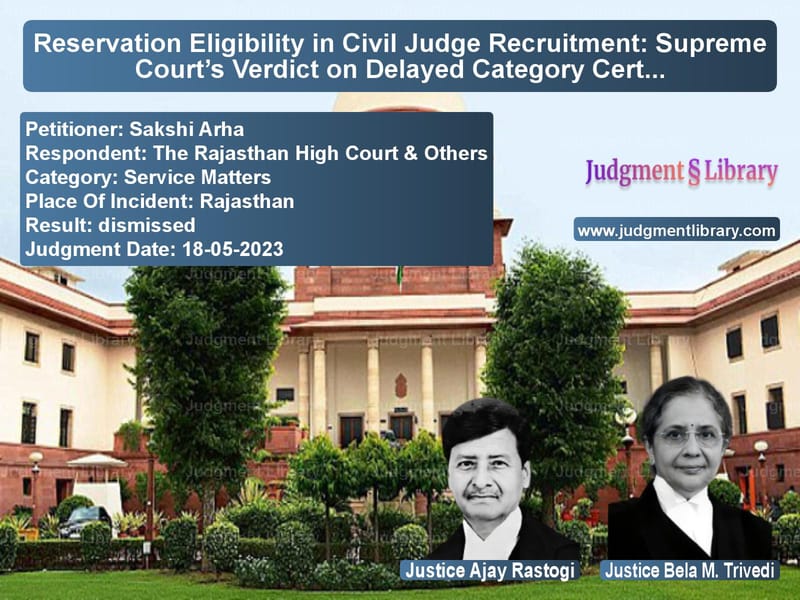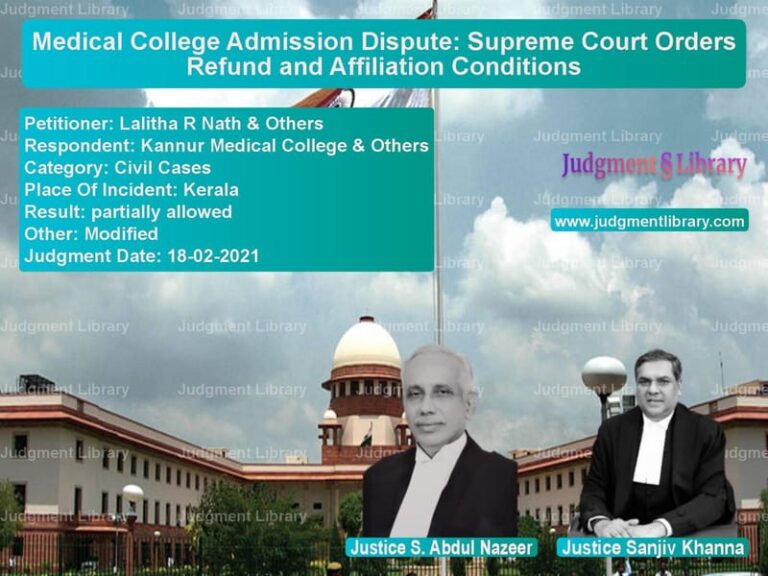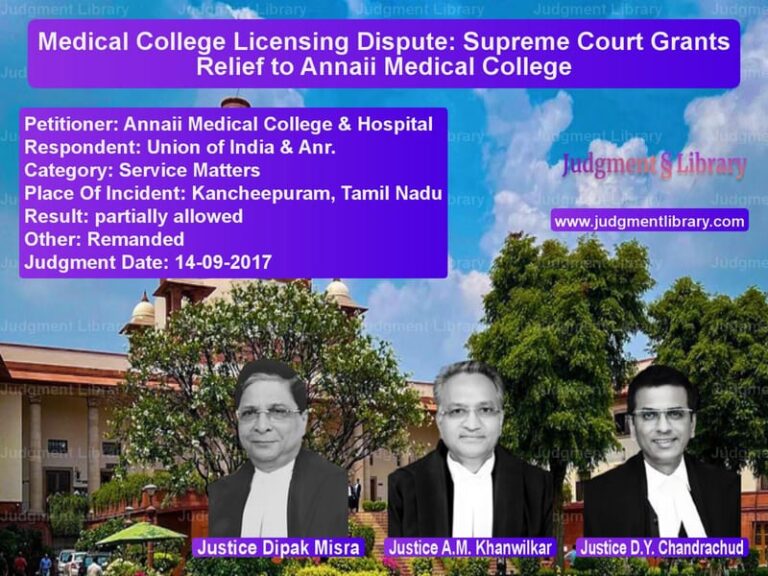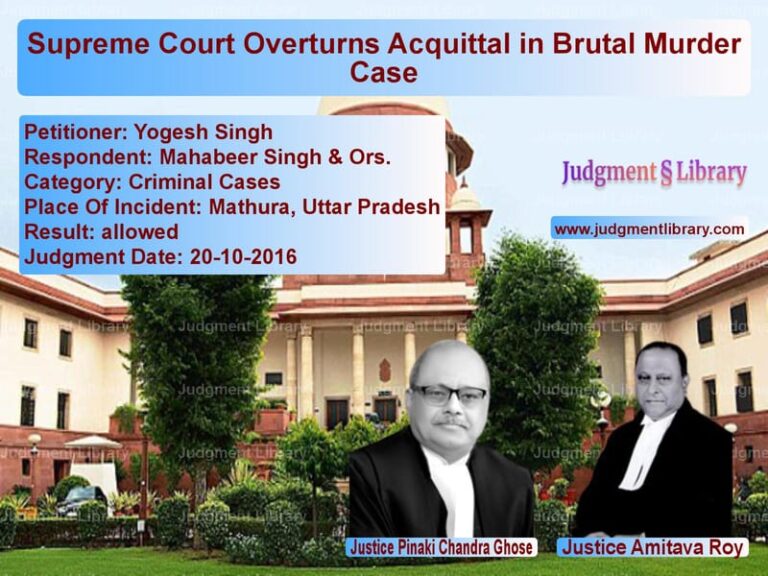Reservation Eligibility in Civil Judge Recruitment: Supreme Court’s Verdict on Delayed Category Certificates
The Supreme Court of India, in the case of Sakshi Arha vs. The Rajasthan High Court & Others, delivered a crucial judgment on the applicability of reservation benefits in recruitment processes when candidates submit their category certificates after the last date of application. The judgment clarifies the validity of claims under the Other Backward Classes (OBC) non-creamy layer and Economically Weaker Section (EWS) categories in public employment and establishes strict adherence to procedural deadlines.
Background of the Case
The case originated from a recruitment notification issued by the Rajasthan High Court for the post of Civil Judge in Rajasthan Judicial Services (RJS). The notification required candidates seeking reservation benefits to submit valid category certificates along with their applications before the prescribed deadline. The petitioner, Sakshi Arha, applied under the OBC Non-Creamy Layer (NCL) category but submitted her category certificate after the last date of application submission. Consequently, her application was rejected, and she was treated as an unreserved (General) category candidate.
Aggrieved by this decision, the petitioner challenged the rejection before the Rajasthan High Court, arguing that she was entitled to reservation benefits despite the delayed submission of her category certificate. The High Court dismissed her plea, prompting her appeal before the Supreme Court.
Legal Issues Considered
The Supreme Court examined several key legal questions:
- Whether candidates who fail to submit category certificates before the deadline can still claim reservation benefits.
- The legal validity of treating such candidates as General category applicants despite their eligibility for reservation.
- Whether the strict application of procedural deadlines violates the substantive rights of candidates under the reservation system.
- The impact of the Court’s decision on future recruitment processes for public sector employment.
Arguments by the Petitioner
The petitioner contended that:
- She met the eligibility criteria for the OBC-NCL category but could not obtain the certificate before the application deadline due to administrative delays.
- The requirement to submit the certificate along with the application was merely procedural and should not override her substantive right to claim reservation.
- Similar relaxations had been granted in previous recruitment cycles, and denying her reservation benefits amounted to discrimination.
- The Rajasthan High Court’s decision to treat her as a General category candidate violated the principles of fairness and natural justice.
Arguments by the Respondents (Rajasthan High Court & Others)
The respondents, represented by the Rajasthan High Court and the State Government, argued that:
- The recruitment notification clearly stipulated that reservation benefits would be granted only if the candidate submitted a valid category certificate before the deadline.
- Allowing candidates to submit certificates after the deadline would compromise the integrity of the selection process and lead to administrative difficulties.
- The petitioner was treated as a General category candidate as per the rules, and there was no violation of her rights.
- Any relaxation of procedural requirements would set a bad precedent, encouraging future candidates to disregard deadlines.
Supreme Court’s Observations
Strict Adherence to Recruitment Guidelines
The Supreme Court emphasized that recruitment notifications serve as binding guidelines for both candidates and the recruiting authority. The Court noted:
“The conditions specified in a recruitment notification have the force of law. Candidates must comply with all requirements, including document submission deadlines, to avail reservation benefits.”
Distinction Between Eligibility and Procedural Compliance
The Court made a clear distinction between eligibility for reservation and procedural compliance. While the petitioner was eligible for the OBC-NCL category, she failed to fulfill the procedural requirement of submitting a valid certificate before the deadline. The Court held that procedural requirements must be followed strictly to ensure fairness in the selection process.
Impact on Future Recruitment Cycles
The Supreme Court recognized the broader implications of its ruling. Allowing candidates to submit certificates post-deadline would create uncertainty and inconsistencies in future recruitment cycles. The Court cited the case of Rajasthan Public Service Commission vs. Kailash Chand Sharma (2021), where it ruled that procedural timelines in recruitment must be enforced strictly to maintain administrative efficiency.
Judicial Precedents Supporting Strict Timelines
The Court relied on past judgments reinforcing the principle that deadlines in government recruitment must be strictly followed. In K. Manjushree vs. State of Andhra Pradesh (2008), the Supreme Court ruled that any deviation from recruitment rules leads to unfair advantages for certain candidates, jeopardizing the fairness of the process.
Final Judgment
The Supreme Court ruled that:
- The petitioner’s application was rightly rejected due to the late submission of the category certificate.
- Recruitment authorities are bound by the terms of the notification, and deviations cannot be permitted on an individual basis.
- Reservation benefits can only be granted if all required documents are submitted within the stipulated timeframe.
- The Rajasthan High Court’s decision was upheld, and the appeal was dismissed.
Key Takeaways
- Strict Compliance with Recruitment Notifications: The ruling establishes that all procedural requirements in government recruitment processes must be followed without exceptions.
- Deadlines are Binding: Candidates cannot claim reservation benefits if they fail to submit required documents within the prescribed timeframe.
- Fairness in Selection Process: Allowing post-deadline submissions would compromise the integrity of recruitment, leading to unfair advantages.
- Impact on Future Employment Cases: The decision serves as a guiding principle for all future reservation-related disputes in public sector employment.
Conclusion
The Supreme Court’s judgment in Sakshi Arha vs. The Rajasthan High Court sets a clear precedent for the strict enforcement of recruitment guidelines in public sector employment. The ruling ensures that procedural timelines are respected, maintaining fairness and uniformity in government job selections. By rejecting the plea for post-deadline document submission, the Court has reinforced the principle that compliance with recruitment rules is essential for upholding the integrity of the reservation system.
Petitioner Name: Sakshi Arha.Respondent Name: The Rajasthan High Court & Others.Judgment By: Justice Ajay Rastogi, Justice Bela M. Trivedi.Place Of Incident: Rajasthan.Judgment Date: 18-05-2023.
Don’t miss out on the full details! Download the complete judgment in PDF format below and gain valuable insights instantly!
Download Judgment: sakshi-arha-vs-the-rajasthan-high-c-supreme-court-of-india-judgment-dated-18-05-2023.pdf
Directly Download Judgment: Directly download this Judgment
See all petitions in Recruitment Policies
See all petitions in Public Sector Employees
See all petitions in Employment Disputes
See all petitions in Judgment by Ajay Rastogi
See all petitions in Judgment by Bela M. Trivedi
See all petitions in dismissed
See all petitions in supreme court of India judgments May 2023
See all petitions in 2023 judgments
See all posts in Service Matters Category
See all allowed petitions in Service Matters Category
See all Dismissed petitions in Service Matters Category
See all partially allowed petitions in Service Matters Category







